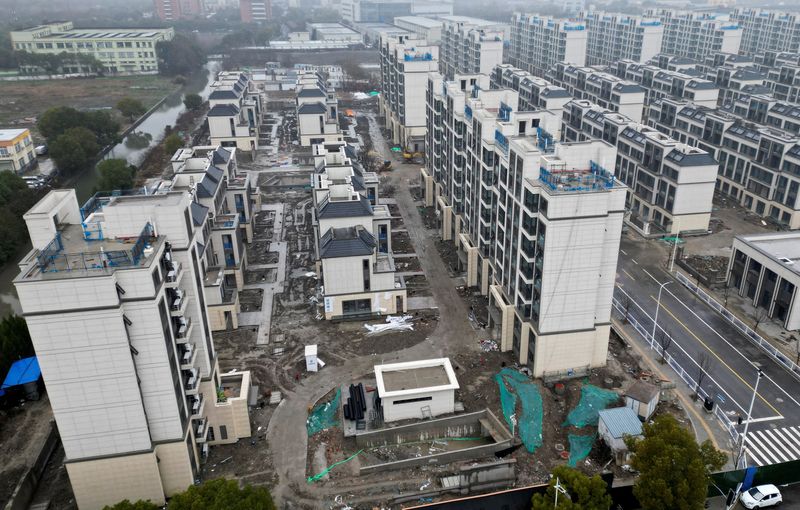By Liangping Gao and Clare Jim
BEIJING/HONG KONG (Reuters) - A campaign by Chinese authorities to encourage people to replace their old apartments with new ones is attracting interest, but faces one major hurdle: the participants in the scheme are struggling to sell their current homes.
Flagged at a key political meeting last month, the campaign is meant to help cities across China offload their growing stock of new apartments and provide crucial cash flow to ailing developers. As of May 6, more than 50 cities have launched their own versions of the "swap old for new" scheme, according to a private survey by China Index Academy.
But analysts, real estate agents and developers say buying interest in second-hand homes is very limited, casting doubt over the success of the campaign and suggesting the property sector downturn in China has further to run.
"Some people have enquired about the campaign, but so far we haven't had any successful transactions," said Qin Yi, a property agent in Shanghai.
"The biggest problem is selling the second-hand properties."
The swap scheme is the latest in a string of support measures China has taken since 2022 as it tries to breathe life into a sector that represented around a fifth of economic activity at its peak and remains a major drag on growth.
China has lowered interest rates and down payments and most cities have eased or removed prior purchase restrictions. A whitelist developer funding programme for project completion is also struggling to get traction.
Demand for both new and second-home properties in China has been falling, especially in smaller cities, as would-be buyers worry prices may drop further and that some developers would not be able to complete projects.
At the same time, the number of both types of properties listed for sale has been growing.
There were 395 million square metres (4.25 billion square feet) of new housing for sale in January-March, up 24% year-on-year, the latest official data show. Meanwhile, new home sales stood at 189.42 million square m in the same period, down 28% year-on-year.
'OFF A CLIFF'
In the secondary market, the number of properties listed for sale was 20 times higher than the number of transactions in April, according to a survey of 14 cities by Zhuge Real Estate Data Research Centre. Listings were up 294% year-on-year in Shenzhen, and 39% in Shanghai, it said.
Additionally, tens of millions of apartments are yet to be completed in China.
"Sales have been falling off a cliff," says Ma Hong, senior analyst at GDDCE Research Institution in Shanghai, who estimates the swap programme will have a limited impact. "Very few people dare to buy a house."
"Absent more innovative tools, such as a property stabilisation fund, the market downtrend will continue."
Some 96% of Chinese households already own at least one home. Before the market turned, the Chinese had for decades regarded apartments - especially the new, more modern ones - as the safest place to park their savings.
Most of the cities taking part in the scheme are asking buyers to put down a deposit for a newly built apartment, which they can take back in full after two or three months if they fail to sell their existing homes to finance the purchase. Cities are offering lower taxes and fees for the transaction if completed.
A property agent in the tech hub of Shenzhen, who only gave his surname Zhou, said more than a dozen people have placed deposits, but that their homes "don't seem to have sold yet."
In Chongqing, a city of more than 30 million in southwestern China, which has piloted the scheme since February, an agent surnamed You said it "had no obvious effect" on demand.
Zhengzhou, a central city of about 13 million, has asked developers to purchase second-hand homes.
One executive at a Chinese developer, asking for anonymity due to the topic's sensitivity, said their firm "had no interest in participating" because the second-hand market was "very bad." An executive from another developer described the swap programme as "meaningless."
"Nobody is buying, so how do you sell to swap?" the second developer said.

Given limited success of existing incentives to spur demand, China is considering a plan for local governments nationwide to buy millions of unsold homes, Bloomberg News reported.
"The government may need to intervene and manage secondary market supply if housing price expectations remain negative," Goldman Sachs analysts said in a note this week.